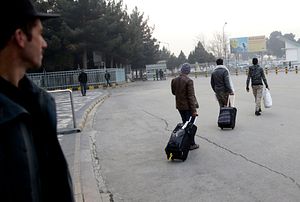In 2015, the European Union experienced one of the largest migratory flows in history, receiving over 1 million asylum applications. Branded as a crisis, this substantial flow of people in pursuit of safety and security continues to this day. In fact, over 3 million people have entered the EU since.
While headlines often ascribe the war in Syria as the primary catalyst for this mass migration, Syrians comprise only a fraction of the total, reaching 16 percent in 2017. Other primary countries of origin for migrants were Iraq, Afghanistan, Nigeria, and Pakistan. The victims of Syria’s ongoing, deadly conflict certainly deserve media spotlight, but a parochial focus tends to dilute and obfuscate the larger debate on human rights in Europe. It shadows the fates of asylum seekers from countries other than Syria. The EU has exploited media silence around countries like Iraq and Afghanistan to ignore its obligations to those countries under international refugee law, the very humanitarian legal regime that many of its member states helped to craft after World War II.
The EU-Afghanistan 2016 “Joint Way Forward” agreement exemplifies the EU’s retreat from its humanitarian ethos. At a donor conference in Brussels, EU member states coerced Afghanistan officials into accepting 80,000 returning EU asylum applicants in exchange for billions of dollars in reconstruction aid. The deal operates on the assumption that Afghanistan is moving toward stabilization, yet Afghanistan’s current security situation remains mired in conflict. Since 2016, when the Joint Way Forward was drafted, over 20,000 Afghan civilians have been killed, and Transparency International estimates Afghanistan’s government to be one of the top 10 most corrupt in the world.
While not every Afghan is persecuted at the individual level, there hardly lies any place in the country free from the risk of violent attacks – not even the U.S. Embassy. A few weeks ago, the deputy director of UNHCR Afghanistan, Aurvasi Patel pleaded for the Austrian government to stop forced deportations. However, a leaked, restricted memo showed that the EU paid little heed to such advice and disregarded 50,000 Afghan lives in exchange for a few billion dollars.
Patel’s plea for granting Afghans asylum comes at a time when the civilian death toll is on its way to breaking former records, underpinning the need for EU member states to accept Afghan asylum seekers. But even aside from such a strong humanitarian imperative, the EU ought to accept Afghan asylum seekers for legal reasons. The EU and its member states, many of whom are also NATO members, are still engaged in an active war in Afghanistan. While the 1951 refugee convention does not oblige warring states to accept refugees from enemy countries, the EU Charter of Fundamental Rights and the European Convention on Human Rights necessitates not only that irregular migrants receive humane treatment, but also that any deportations respect migrant dignity and safety. Especially because of Afghanistan’s continued, escalating conflict, all Afghan asylum seekers to the EU should qualify for subsidiary protection.
Additionally, Article 6 of the European Convention of human rights asserts asylum seekers’ right to a fair trial, a rule with which most EU states do not seem to fully comply. In fact, an Austrian newspaper recently reported that, due to political pressure and insufficient training for the authorities involved, asylum proceedings are as arbitrary as throwing a die. Thus, although the Just Way Forward references both the EU Charter and the Universal Declaration of Human Rights (UDHR), the deal ignores both the inhumane upheaval and trauma caused by deportation and discredits the imminent danger facing asylum seekers upon returning to their home country.
The EU’s neglect toward international refugee law reveals its crumbling cornerstone of human rights. “Humanitarian solutions” like the Just Way Forward address the EU migration crisis with a turned back, even though many EU member states were central to drafting the UDHR, despite the fact that the EU Charter of Fundamental Rights is the EU’s own foundational humanitarian document. Hence, the EU’s human rights hypocrisy. The EU saves girls like Malala from a savage and oppressive culture, yet bombs Pakistan and its neighboring countries through targeted airstrikes with no end in sight. The EU sends more troops to war in Afghanistan while simultaneously sending survivors fleeing the war back into Kabul.
It is legally irresponsible to deport people back to a country still actively at war. It is morally unsustainable for EU member states — the authors of modern human rights law — to deport migrants protected under international refugee law while claiming to be built from a foundation respecting and upholding international human rights. Forcing Afghanistan — a country that continues to be one of the most underdeveloped, a country with 25 percent of its population suffering from malnutrition — to take back people seeking asylum in EU territory, reveals complicity toward the slaughter of innocent humans, something Europe once pledged never to let happen again.
The EU can either return to upholding human rights, working to protect the lives of all people residing within its borders, or continue to let its humanitarian foundation decay with policies like the Just Way Forward, recognizing human rights only when the consequences of not doing so would put EU states under media scrutiny. As it stands, EU member states would be hypocritical to preach human rights given the reality facing Afghan refugees. The ultimate question is whether EU humanitarian values no longer apply to people of all colors, if they ever did.
Mirwais Wakil is a policy advisor at NEOS, a political party in Austria. He holds an MSc. in International Relations from the London School of Economics. Follow him on Twitter: @wakilmirwais
































